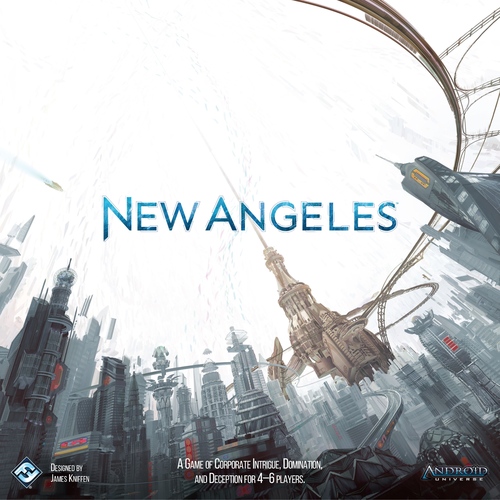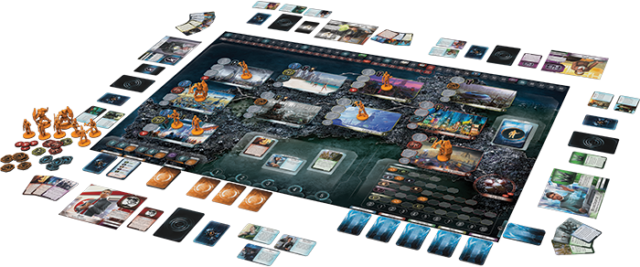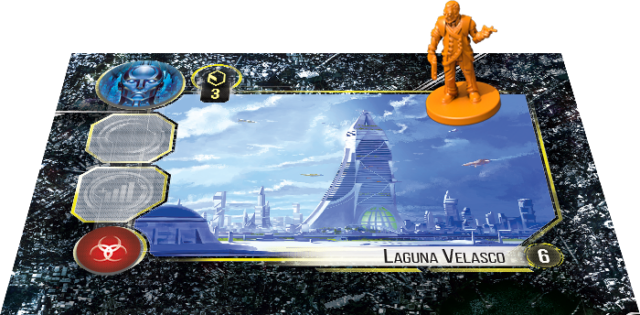
I probably shouldn’t admit to this, but do you know what I love to do when playing games? I love to be an absolute git to everyone else involved. Day to day I like to see myself as quite a nice person, someone who helps other people out and has a suitable amount of compassion, but when I’m involved in something that takes me away from real life I prefer to be a bit of a bastard. In video games like Skyrim I’ll often take the cold-hearted route, just to see what happens and how people react when you’re horrible to them, and when the chance arises in the board game I’ll sometimes do exactly the same. As such a game like New Angeles which has you forging alliances with other players and making careful bargaining agreements, right before pulling the rug out and stabbing your partners in the back, is one which I will always be interested in playing. And the great part is as long as you’ve got some like-minded players to buddy up with there are some great games to be had – but only if you can find the right people to play with and don’t mind the 3 hour time slot you’ll need to get through it in one sitting.
The idea behind new Angeles revolves around the megacorporations of the Android universe, a theme running through several of Fantasy Flight’s games over the past few years. Each player (of which you’ll be needing between 4 and 6) takes control of one of these companies, trying to get a financial edge over their opponents while all the while trying not to make a total hash of the city as a whole. There’s a large element of teamwork involved between players in order to prevent the city from descending into chaos, and as such you’ll need to put some trust into what other players are suggesting otherwise you’ll soon find everything spiralling out of control; but how do you know when to see a proposed negotiation as a city-supporting measure when the other players could just be out to take advantage of the situation?

Well, you don’t. That’s just it. You need to read other players, you need to try and work out what’s in it for them every bit as much as yourself. If one person loses, then everyone loses, but every player also has a secret rival to beat for their own individual victory – one player, the Federalist, serves a different role and needs the city to completely break down and succumb to chaos in order to win; they’re effectively only there to cleverly disrupt the other players. You know someone is doing it, but it’s not easy to work out who. Nice. Everyone else will have their own secret rival throughout the game who they’re trying to get one over on, and while it’s entirely possible that two players will end up rivalling each other it’s every bit as possible for there to be a circle of deceit, with each player squaring off against another, who in turn is rivals with another and so on. Not knowing who is trying to screw you over is a fantastic mechanism in the game, and makes for some very edgy negotiations throughout. In one game I was convinced I knew who had me as their rival, so tried to be quietly difficult with them only to realise later that someone else had been subtly doing the same to me – I was so engrossed by trying to get ahead of my rival I hadn’t even noticed it happening.

Throughout the game you’ll also be drawing Event cards, situations which change the landscape of the game and demand various resources be placed on the board under certain conditions. It adds a level of tension and certainly makes the negotiations more tense as the game goes on, to the point that as things start to reach their climax after a couple of hours it’s not uncommon for full scale arguments to break out as players try to maximise any tiny advantage they have. As such, if you’re a fan of tight negotiating and trying to squeeze everything you can out of a deal then you’ll really love this game, but it’s also the reason why it might fall down for some.
It seems quite obvious to say “if you don’t like games like this, then you won’t like this game” – this is true of pretty much every game that exists, but I’d say it’s especially true for New Angeles. Not only that, you’ll need a group of 3 or 4 others who similarly enjoy this kind of bartering and negotiating throughout a longer session of three hours or more; it only takes one person to not be overly keen and it can put quite a dent on the flow of the game, something which by itself could be a reason for a lot of people to give this wide berth. That said though, if you haven’t tried this kind of game before (as I hadn’t) or enjoy the chance to be a bit of an arse to people you’re gaming with when they least expect it (as I do) then it might well be worth your time. New Angeles is an engrossing and exciting game with the right crowd, and marks itself as yet another great game from Fantasy Flight. Can those guys do anything wrong..?

Leave a Reply